Archive for October, 2011
Estonia, “the eurozone is our achievement!”
16 Oct 2011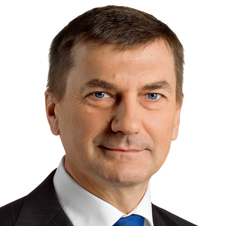 “For several years now the world has lived in the shadow of the recession. Indeed, for some member states of the European Union, the financial crisis still looms large, and it is consequently affecting the eurozone as a whole. But although the recession hit hard, it highlighted Europe’s ability to react to serious problems in an effective way…
“For several years now the world has lived in the shadow of the recession. Indeed, for some member states of the European Union, the financial crisis still looms large, and it is consequently affecting the eurozone as a whole. But although the recession hit hard, it highlighted Europe’s ability to react to serious problems in an effective way…
Having only acceded to the eurozone this year, the government of Estonia is frequently asked whether we regret our decision to adopt the euro at a time when we have to support countries for whose problems we are entirely blameless. The answer I give has always been, and will always be, the same: the euro is of enormous benefit to Estonia in any event, which is why we view our transition to the single currency as such an achievement.
At the same time, being part of the eurozone means that we have to meet all of the obligations that this entails. It is a question of solidarity, which is one of the cornerstones of the EU. We do not know when we may need the help and support of others; providing it is a moral duty. Moreover, it means that a crisis situation in one member state of the eurozone is far from being just that country’s problem: in a common market, one nation’s concerns are shared by everybody.
Of course, we should not forget that every country is still primarily responsible for its own economy and finances, which is why the loans from the support funds are issued on such strict conditions. Measures designed to promote growth will only work once a country has put its finances in order: public services cannot be provided using borrowed money, and doing so is neither sustainable nor morally justifiable. Consequently, this financial support, coupled with decisive action on the part of governments, will ensure the desired results and emergence from the crisis…
In Estonia we did not only keep our revenues and expenditures in balance, but were guided by the principle that its pays to boost your financial reserves when the general economic situation allows you to do so. Although there were recommendations to increase the level of public debt, the Estonian government decided against this and also did not use its reserves for a kind of ‘economic doping’. If we had done so, we would not only have to repay loans, but would also be accruing substantial amounts of interest – happily we are now able to invest that money in new economic growth.
On average, the EU spends 3 per cent of its gross domestic product every year paying interest on loans; in Estonia, however, we only pay 0.2 per cent, whilst also earning more from the placement of our reserves than we pay in interest overall. Furthermore, Estonia has the lowest public sector debt in the EU, which stands at 6.6 per cent of GDP.
Hopefully we will soon be speaking of the financial crisis in the past tense, enabling us to focus our efforts on the other challenges facing the EU. It seems strange, for instance, that we have yet to fully develop the internal market that forms the basis of our economic growth and wellbeing. For Estonia, the development of the internal market means, first and foremost, its adaptation to the demands of the digital age. Business operators and ordinary citizens alike must be able to carry out processes via electronic channels with other countries as easily as they are able to do so in their own nation. If this does not happen, there is no point to the term internal market in the context of the EU.
Estonia, however, has good reason to be satisfied with the e-services it provides… Estonian citizens have come to take the likes of the e-Tax and Customs Board and e-elections for granted, not to mention the other services that reduce bureaucracy and make their lives much simpler.
The Arab spring, meanwhile, has brought another serious problem to the attention of the EU this year: illegal immigrants and refugees. To some extent this has tested the very principles on which the EU is based: the debates that ignited earlier in the year about reinforcing the Schengen zone included proposals regarding the temporary closure of borders. The reinforcement of the Schengen zone is not about restoring national borders, but restoring trust. Doing so depends on us acting together – it is important that all member states fulfil their obligations on an equal footing and help those having difficulty meeting theirs.
Reinstating national borders is something we can and should only consider under exceptional circumstances. It must be the last resort in a situation where requirements are not being met and there are no signs of improvement. Even then a collective decision would be needed. Understanding and compassion must be shown to refugees, who are seeking security and a sense of certainty – positive assurances that the EU offers to its own citizens. Over the decades the EU has grown into an area of great stability that no crisis has yet managed to destroy.
The bigger this area of stability is, the better for the EU as a whole. It is for this reason that Estonia is one of the countries that supports, in principle, the continued expansion of the EU, since this will underpin peace and stability in Europe. As such, we must keep our door open to those who share our values and who are willing to work hard to meet the conditions of accession.”
Andrus Ansip, Prime Minister of Estonia. Complete Article In PublicServiceEurope
Pope Wojtyla’s statue unveiled in Moscow.
15 Oct 2011 A new statue of the Pope John Paul II was unveiled in Moscow on Friday. “This is an extraordinary gesture by the Russian authorities for all Christians living in Russia,” Fr Jozef Zaniewski, rector of Moscow Cathedral of the Immaculate Conception, said. “John Paul II loved Russia and wanted to come here, but he was not able to do it during his lifetime,” Zaniewski continued.
A new statue of the Pope John Paul II was unveiled in Moscow on Friday. “This is an extraordinary gesture by the Russian authorities for all Christians living in Russia,” Fr Jozef Zaniewski, rector of Moscow Cathedral of the Immaculate Conception, said. “John Paul II loved Russia and wanted to come here, but he was not able to do it during his lifetime,” Zaniewski continued.
Located in the backyard of the Library of Foreign Literature, the monument was created by Ukrainian sculptor Alexander Vasyatkin and Russian artists Ilya and Nikita Feklin. The decision to unveil it comes after John Paul’s former secretary, Cardinal Stanislaw Dziwisz, donated an ampoule of the Pope’s blood to the cathedral.
The presentation ceremony of the Polish Pope’s statue took place on the day of the 33rd anniversary of the beginning of the conclave, which saw Cardinal Karol Wojtyla elected as pope two days later.
Polska, Wyniki wyborów.
14 Oct 2011SEJM
| Komitet Wyborczy Platforma Obywatelska RP | 39,18% | 207 |
| Komitet Wyborczy Prawo i Sprawiedliwość | 29,89% | 157 |
| Komitet Wyborczy Ruch Palikota | 10,02% | 40 |
| Komitet Wyborczy Polskie Stronnictwo Ludowe | 8,36% | 28 |
| Komitet Wyborczy Sojusz Lewicy Demokratycznej | 8,24% | 27 |
| Komitet Wyborczy Wyborców Mniejszość Niemiecka | 0,19% | 1 |
Państwowa Komisja Wyborcza
SUMMARY POINTS
(1) Real sector performance improved in August despite a more challenging external environment.
(2) Industrial production growth accelerated to 8.9% yoy, benefiting from stronger domestic demand.
(3) Ukraine may have the second largest harvest this year; however, due to grain export duties and a good harvest in neighboring countries, Ukraine’s grain export potential remains untapped.
(4) State budget deficit amounted to UAH 8.6 billion, or 0.8% of full-year forecast GDP. However, due to higher Naftogaz imbalances, the broad fiscal deficit is projected to reach 4% of GDP in 2011.
(5) The government amended the pension law in September and developed a draft 2012 budget law, targeting a general government sector deficit of 2.5% of GDP. However, the IMF is unlikely to restore financing without an increase in natural gas tariffs to the population.
(6) Thanks to a generous harvest, consumer inflation eased to 8.9% in August but is likely to speed up to about 10-11% yoy at the end of the year.
(7) High volatility on international financial markets, worse economic growth prospects and vulnerability of the Ukrainian economy to external shocks caused Hryvnia depreciation pressures to intensify in August-September.
(8) The National Bank of Ukraine is following a tight monetary policy to both reduce inflationary pressures and maintain Hryvnia stability.
(9) The current account gap widened to $3.3 billion over January-August, or 2% of full-year GDP, and is projected to reach 4.5% of GDP in 2011.
(10) Ukraine’s external debt financing needs remain high. From July 2011 to June 2012, Ukraine has to repay more than $53 billion.
(11) With the current level of international reserves at $38 billion and assuming there is no major external shock, Ukraine’s foreign currency needs look manageable. However, as external risks are high, restoration of cooperation with the IMF looks crucial to reduce Ukraine’s vulnerabilities
ANALYTICAL REPORT: by Olga Pogarska, Edilberto L. Segura
SigmaBleyzer Private Equity Investment Firm & The Bleyzer Foundation (TBF), Kyiv, Ukraine
U.S.-Ukraine Business Council (USUBC)
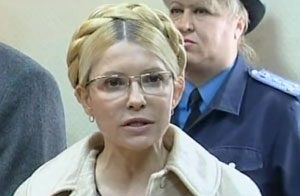 Colpevole e condannata a sette anni di carcere. Il giudice non aveva ancora finito di leggere la sentenza che Julija Timoshenko gridava già alle televisioni di tutto il mondo la sua rabbia. L’ex primo ministro ucraino è una donna tutta d’un pezzo. Con lei le mezze misure non valgono: o la si ama o la si odia. Nessun leader politico era mai riuscito a dividere in simil maniera l’Ucraina. “Assistiamo ad un nuovo 1937 – ha urlato in tivù la Timoshenko, indignata, dopo che, per un paio d’ore, aveva sorriso nervosamente ai presenti in aula -. Ucraini, alzatevi e lottiamo insieme contro la dittatura. Porterò il mio caso alla Corte europea dei diritti umani”.
Colpevole e condannata a sette anni di carcere. Il giudice non aveva ancora finito di leggere la sentenza che Julija Timoshenko gridava già alle televisioni di tutto il mondo la sua rabbia. L’ex primo ministro ucraino è una donna tutta d’un pezzo. Con lei le mezze misure non valgono: o la si ama o la si odia. Nessun leader politico era mai riuscito a dividere in simil maniera l’Ucraina. “Assistiamo ad un nuovo 1937 – ha urlato in tivù la Timoshenko, indignata, dopo che, per un paio d’ore, aveva sorriso nervosamente ai presenti in aula -. Ucraini, alzatevi e lottiamo insieme contro la dittatura. Porterò il mio caso alla Corte europea dei diritti umani”.
L’ex premier è stata condannata per abuso di potere e malversazione. Nel gennaio 2009, dopo l’ennesima guerra del gas con Mosca condita da estenuanti trattative, ha concordato con Putin un contratto che avrebbe procurato all’Erario nazionale circa 200 milioni di dollari di danni.
L’esito del processo, secondo numerosi specialisti, era scontato. Gli oligarchi ucraini, a suo tempo, avrebbero promesso di fargliela pagare all’“eroina” della rivoluzione “arancione” dell’autunno 2004. Troppe volte la Timoshenko, in carica come primo ministro, aveva messo loro i bastoni tra le ruote, facendo perdere importanti affari. Ed il presidente Janukovich, suo acerrimo nemico, è il paladino di alcuni di questi oligarchi.
Alle notizie provenienti da Kiev, pronte sono state le reazioni negative di Unione europea e Russia. Bruxelles, attraverso un portavoce comunitario, ha messo in chiaro che questo verdetto rischia di compromettere la decisione di concedere all’Ucraina lo status di Paese associato all’Ue. “Non capisco perché le abbiano dato sette anni”, ha osservato il premier Putin, che ha rimarcato ironicamente che come cifra (sette) non è male. La Timoshenko, ha ricordato il leader russo “non è un’amica, ma un avversario politico, poiché è sempre stata orientata verso Occidente”.
Adesso vi è il serio pericolo che ricominci lo scontro tra Kiev e Mosca per il gas con tutte le conseguenze del caso per gli approvvigionamenti europei. L’80% del metano russo diretto all’Ue passa appunto per l’ex repubblica sovietica. Il presidente Janukovich ha già reso noto di volere assolutamente ridiscutere il contratto siglato dalla Timoshenko nel 2009.
Sullo sfondo di questa resa dei conti interna vi è la lotta per la collocazione geopolitica della strategica Ucraina. Putin la vuole a tutti i costi all’interno della prossima nascente Unione eurasiatica, che dovrebbe controbilanciare ad Est l’Ue. Senza Kiev, Mosca lo sa bene, non si può ricostruire l’impero. Di certo non l’Urss, ma un gruppo economico compatto, in grado di competere al tempo della globalizzazione. Il progetto unionista è centrale nel programma del terzo mandato presidenziale di Vladimir Putin. Janukovich sa perfettamente che gli ucraini non ne vogliono più sapere di Mosca e guardano ad Occidente, ma l’Ue si intestardisce a tenere chiuse le sue porte.
Tornando al verdetto di Kiev, l’ex presidente Jushenko ha affermato che quello della Timoshenko “non è un processo politico”. L’ex premier non si consultò con lui per la firma dell’accordo coi russi. Janukovich ha invece tentato di buttare acqua sul fuoco, asserendo che il giudice ha compiuto il suo dovere applicando il vecchio Codice del 1962. L’ex premier, che viene chiamata la “Khodorkovskij” ucraina ha, però, la possibilità dell’appello.
La Polonia continua nel suo corso liberale – riformista. Questo l’esito delle insidiose legislative, assolutamente non così scontate come potrebbe sembrare. Per la prima volta dal crollo del Muro di Berlino un partito ottiene un secondo mandato consecutivo. A Varsavia si è forse trovato il giusto equilibrio tra stabilità e sviluppo. E la notizia non può che far piacere all’intera Europa.
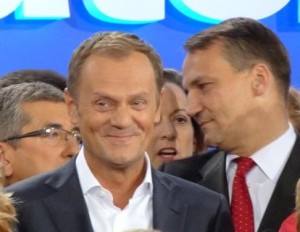
Donald Tusk ed il ministro Sikorski
Sono stati definitivamente sconfitti i fantasmi passati e più recenti. Con l’adesione all’Unione europea nel 2004 è entrato nei libri di storia il secolare penalizzante scenario di un Paese geostrategicamente schiacciato tra Russia e Germania. Gli ultimi tentativi in campagna elettorale di risvegliare i vetusti incubi sopiti nell’animo della nazione polacca non hanno prodotto risultati.
Varsavia è ormai pienamente dentro al processo di integrazione continentale. I suoi sostenitori sono in netta maggioranza. Sebbene Washington e gli Stati Uniti continuino ad essere per lei un punto di riferimento e di ispirazione il primato d’oltreoceano è ora messo in seria discussione da Bruxelles.
Neanche il premier Donald Tusk si aspettava una vittoria così. La sua espressione di entusiasmo nell’apprendere gli exit polls ne è la prova. L’ex dissidente liberale di Danzica ha evitato uno dei tanti colpi di coda così frequenti nella storia del Paese. Nelle ultime settimane i conservatori capeggiati dall’euroscettico Jaroslaw Kaczynski si erano tremendamente avvicinati, fermandosi al 30%.
La Polonia è oggi divisa in due, tra chi gode del boom economico e chi ne è rimasto fuori. Tusk ha, però, vinto perché ha collezionato una serie di successi. Ad esempio la Polonia è l’unico Stato Ue a non essere caduto in recessione nel 2009 anche grazie ai copiosi fondi strutturali europei (elargiti anche come ricompensa per l’abbandono del Paese nelle mani sovietiche dopo la fine della guerra) ed agli investimenti stranieri, soprattutto statunitensi.
La grande sorpresa di queste elezioni è rappresentata dall’incredibile avanzata nella cattolicissima Polonia della lista “anticlericale” dell’imprenditore Janusz Palikot, che si batterà per i diritti dei gay e la liberalizzazione della marijuana. In caduta libera sono, invece, gli ex comunisti, ora socialdemocratici, di SLD.
Inizia adesso per Tusk un nuovo mandato, più complicato del primo, soprattutto per la crisi economica internazionale. Oltre al rischio tipico di sedersi sugli allori, si devono gestire al meglio la trattativa in corso sul budget Ue 2014-2020 (a Varsavia dovrebbero andare 81 miliardi, nel precedente 67), l’importantissima vetrina dei campionati europei di calcio nel 2012 ed una maggiore liberalizzazione dell’economia. Vincere queste sfide, non dimenticandosi delle ampie differenze interne, garantirà alla Polonia un futuro di prosperità.
Poland-Polonia, exit polls
9 Oct 2011| Parties | 2007 | 2011 |
| Piattaforma civica – Civic Platform – PO | 41,5% – 209 seats | 39,6% |
| Legge e Giustizia – Law and Justice – PiS | 32,1% – 166 seats | 30,1% |
| Lista Palikot – Palikot’s movement |
Non partecipò – Did not stand |
10,1% |
| Socialdemocratici – Democratic Left A. – SLD | 13,2% – 53 seats | 7,7% |
| PSL Polish People party | 8,9% – 31 seats | 8,2% |
| PJN – Poland comes first |
Non partecipò – Did not stand |
2% |
TVP – TVN24 Warsaw 21h.
Affluenza alle urne 2011 – 48,92%
Turnout in 2011 – 48,92%
Affluenza in 2007 – 53,88%
Turnout in 2007 – 53,88%
Tusk contro Kaczynski. Il liberale contro l’ultra conservatore. Il moderno filo-occidentale, attualmente leader semestrale di turno dell’Unione europea, contro l’euroscettico, che critica pesantemente i nemici storici tedeschi e russi.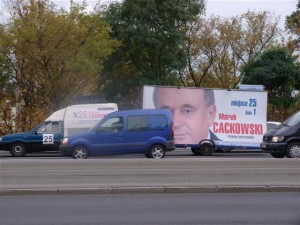
I polacchi, che appaiono sempre più divisi tra coloro che godono del boom economico di questi anni e chi invece si è ulteriormente impoverito, scelgono tra due visioni opposte. Non è un caso che il premier Donald Tusk abbia chiuso la sua campagna elettorale incontrando a Varsavia migliaia di ragazzi nel rinnovato stadio nazionale, simbolo della Polonia post comunista e fiore all’occhiello di Euro 2012. Jaroslaw Kaczynski, al contrario, ha preferito partecipare ad un pranzo tradizionale in provincia, ospite di una semplice famiglia. Città contro campagne, dunque. Giovani contro generazioni più mature.
Venerdì sera colpiva il visitatore straniero osservare il contrasto tra una decina di anziani con le candele in mano raccolti in preghiera davanti al palazzo presidenziale in ricordo dei morti della tragedia aerea di Smolensk dell’aprile 2010, mentre tutto intorno bar e ristoranti, pieni all’inverosimile di persone mezze ubriache appartenenti alla classe media, sparavano musica a tutto volume.
In queste tese settimane Tusk ha parlato di economia, di riforma delle pensioni, di controllo del deficit di bilancio e del debito (addirittura il 55% del Pil!). Il Paese, che sta gestendo le trattative per il bilancio continentale UE 2014-2020, è prossimo a nuove privatizzazioni ed alla costruzione di altre infrastrutture, finanziate sempre con i fondi europei (67 miliardi di euro nel precedente bilancio UE, forse 81 nel prossimo). Durante il suo premierato gli stipendi medi sono aumentati del 18%, la Polonia cresce da un decennio al ritmo del 3% ed è l’unico Stato Ue a non essere caduto in recessione nel 2009.
Jaroslaw Kaczynski, che non ha perso la sua bellicosità dopo la tragica morte del fratello-gemello presidente Lech a Smolensk, ha ribattuto punto su punto, aiutato dai candidati del suo partito Legge e Giustizia. Non ha, però, mancato di risvegliare i vecchi fantasmi, affermando che la Merkel è diventata cancelliera anche grazie alla Stasi, i servizi segreti della DDR.
L’ago della bilancia della partita potrebbero essere gli altri contendenti. Solo 5 formazioni – affermano sondaggi contrastanti – dovrebbero superare la barriera del 5%, per avere una rappresentanza parlamentare. Molto dipenderà dal tasso di affluenza alle urne e dalla performance di PSL, alleato di coalizione di Piattaforma civica di Tusk, mentre sorprende la forza della Lista “anticlericale” di Janusz Palikot a scapito dei socialdemocratici di SLD.
Se Piattaforma civica vincerà sarà il primo partito dal 1989 ad ottenere due mandati consecutivi. La paura della classe media nazionale e della Commissione europea è, però, che inizi un periodo di instabilità politica anche in Polonia. Un altro mal di pancia per Barroso e company non ci vorrebbe proprio!
От Хасселя до Лилина стереотипы о русских.
6 Oct 2011 «Самый плохой роман, который я купил за все время, что живу в России, был на английском. Год назад в книжном магазине в Москве мой взгляд упал на обложку с пестрой картинкой: фриц смотрит из башни немецко-фашистского танка и орет. Называется книга «Wheels of Terror», по-русски «Колеса ужаса». Автор — Свен Хассель, датчанин, который, по собственному признанию, имел стойкий нордический характер и натурализировался в Германии перед войной, чтобы стать немцем и получить право служить в рядах вермахта….
«Самый плохой роман, который я купил за все время, что живу в России, был на английском. Год назад в книжном магазине в Москве мой взгляд упал на обложку с пестрой картинкой: фриц смотрит из башни немецко-фашистского танка и орет. Называется книга «Wheels of Terror», по-русски «Колеса ужаса». Автор — Свен Хассель, датчанин, который, по собственному признанию, имел стойкий нордический характер и натурализировался в Германии перед войной, чтобы стать немцем и получить право служить в рядах вермахта….
Врагов, то есть русских, много. Особенно сибиряков низкого роста, с узкими азиатскими глазами…Неприятный народ эти русские, но, слава богу, они чуть тупее, чуть медленнее и чуть слабее немцев…
Датские журналисты, однако, пишут, что член СС Хассель «воевал» у себя дома, в Дании, в качестве помощника немецких оккупантов. Короче, простой южноскандинавский полицай…
А пару недель назад в берлинском книжном магазине я вышел на другую военную литературу. Автомат суперпрофессионального спецназовца на обложке целился прямо в меня. Название: «Freier Fall» («Свободное падение»). Автор — некий Николай Лилин. «Это о войне в Чечне», — объяснила мне продавщица…Ну, купил я это «Свободное падение». Начал читать. И сразу же ощутил, что попал под «колеса ужаса» русского наследника датско-немецкого Хасселя.
Точнее, под «колеса» его приднестровско-русского наследника. Ведь роман начинается с того, что военкомат в родном приднестровском городке посылает главному герою повестку: пора воевать… в Чечне. Но герой совсем не хочет в солдаты. Пытается убежать — бесполезно. Его отправляют на войну насильно — в грузовике, полном другими приднестровскими призывниками. И попадает он прямо в российские диверсанты. Из него делают снайпера — и вперед, в Ичкерию!
После победы в бою лилинские воины пленных не берут. Вообще русские диверсанты какие-то недобрые парни. Они ругают коррумпированных политиков да генералов, а сами мочат всех с особой жестокостью. Герой Лилина по просьбе своего начальника простреливает колени молодому арабу, чтобы тот мог бить пленного сапогом по ранам. А потом ножом снимает у жертвы кожу на груди и вырезает там летучую мышь — герб диверсантов. Звери-красноармейцы Хасселя отдыхают…Похоже, что у автора очень хорошо с фантазией. И что он скорее воевал за компьютером, чем в Чечне.
Как оказалось, писатель Лилин еще несколько лет назад уехал в Италию. Его персональный сайт — на итальянском. И говорят, что он запрещает переводить свою прозу на русский. Это понятно. Ведь в России в отличие от Италии знают, что Приднестровье — это никакой не болотистый ландшафт между Таганрогом и Томском и российских военкоматов там нет. Что в Чечне воевало куда больше чеченцев, чем арабов. Что русские бойцы не чувствовали себя и не вели там, как игроки в компьютерной стрелялке. А еще в России знают, кто такой Остап Бендер.
Гораздо обиднее, что Европа так поглупела. Серьезные издательства в Италии и Англии продают лилинские комиксы без картинок как документальное повествование о войне, основанное на реальных событиях. А в Германии литературные критики перед ним разве что не стоят на коленях…»
Статья – Штефан Шолль – Московский Комсомолец № 25762 от 4 октября 2011 г. Stefan Scholl Moskovskij Komsomolets
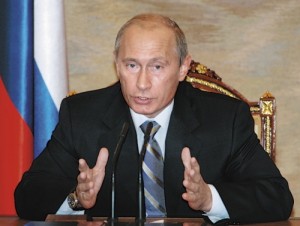 «1 января 2012 года начинает свою работу Единое экономическое пространство России, Белоруссии и Казахстана. И в преддверии этого события Владимир Путин поставил свою подпись под программной статьей с многообещающим названием « Новый интеграционный проект для Евразии — будущее, которое рождается сегодня».
«1 января 2012 года начинает свою работу Единое экономическое пространство России, Белоруссии и Казахстана. И в преддверии этого события Владимир Путин поставил свою подпись под программной статьей с многообещающим названием « Новый интеграционный проект для Евразии — будущее, которое рождается сегодня».
Если вкратце, то россиянам обещан новый союз — правда не Советский, а Евразийский. Составить его ядро должны нынешние члены «клуба на троих» – Москва, Астана и Минск….
Внешнеполитический курс ВВП можно и нужно за многое ругать. Но упорное путинское стремление вновь запустить в бывшем СССР интеграционные процессы — это то, что полностью отвечает нашим национальным интересам.
Мы живем в эпоху грандиозных геополитических сдвигов в Евразии. Великий спящий мировой политики — Китай – очнулся и с каждым годом все более уверенно играет мускулами. Исламский фундаментализм стал для начала ХХI века тем, чем коммунизм был для первой половины века ХХ: воинственная идеология словно лесной пожар захватывает все новые и новые территории…
Если Россия махнет рукой на ближнее зарубежье и будет сидеть сложа руки, нам попросту сомнут. Надеяться по старинке, что « никуда они от нас не денутся» – верх глупости и самонадеянности. Денутся и еще как. Но просто бороться с « происками мирового империализма» – тоже не выход. Лучшая оборона — это наступление. А в наступать в этих обстоятельствах — предложить свою привлекательную интеграционную идею…
Этим летом я несколько раз был в Казахстане. И могу засвидетельствовать: таможенный союз — это тема разговоров номер один даже для людей, бесконечно далеких от политики. Механизмы таможенного союза запускаются один за другим. И это оказывает влияние на жизнь всех — от олигарха до простого работяги…
Но Путин и Назарбаев ( Лукашенко здесь в роли примкнувшего) упорно руководствуются принципом: « Не разбив яиц, не приготовишь яичницу». И их расчет понятен: чем большего размера единый рынок, тем больше возможностей для развития бизнеса. Проиграв сегодня в мелочах, вы завтра выиграете по крупному — вот что пытаются сказать своим народам Владимир Владимирович и Нурсултан Абишевич…
Почему же до самого недавнего времени в своих отношениях с Киевом Москва вела себя с точностью до наоборот? Напомню, что до рандеву Путина и Медведева с Януковичем в « Завидово» Украине говорилось до открытым текстом: хотите понижения цен на газ? Тогда либо вступайте в Таможенный союз, либо отдавайте нам свою газотранспортную систему! Иначе это будет иждивенчество!
Но как же тогда нам строить отношения с Киевом? Ведь без Киева любое интеграционное объединение в бывшем СССР будет оставлять ощущение неполноты…
…Евразийский союз будет строиться на универсальных интеграционных принципах как часть Большой Европы».
« Большая Европа» – это, конечно, очень сильное заявление. Рубежи интеграционного объединения Москвы, Астаны и Минска уходят далеко в глубь Азии. Покойный президент Франции генерал де Голль мечтал об « Европе от Атлантики до Урала». Но он трижды перевернулся в гробу, если бы ему сказали: « Месье генерал, теперь водораздел между Европой и Азией проходит по границе Казахстана и Узбекистана в районе города Чимкента».
Статья – Михаил Ростовский Московский Комсомолец № 25763 от 5 октября 2011 г. Mikhail Rostovsky Moskovskij Komsomolets
Welcome
We are a group of long experienced European journalists and intellectuals interested in international politics and culture. We would like to exchange our opinion on new Europe and Russia.
Categories
- Breaking News (11)
- CIS (129)
- Climate (2)
- Energy&Economy (115)
- EU Eastern Dimension (85)
- Euro 2012 – Sochi 2014 – World Cup 2018, Sport (43)
- Euro-Integration (135)
- History Culture (198)
- International Policy (261)
- Military (74)
- Interviews (18)
- Italy – Italia – Suisse (47)
- Odd Enough (10)
- Poland and Baltic States (126)
- Religion (31)
- Russia (421)
- Survey (4)
- Turning points (4)
- Ukraine (176)
- Российские страницы (113)
Archives
- November 2020
- October 2020
- September 2020
- August 2020
- July 2020
- May 2020
- April 2020
- March 2020
- January 2020
- December 2019
- November 2019
- October 2019
- September 2019
- August 2019
- July 2019
- June 2019
- May 2019
- April 2019
- March 2019
- February 2019
- December 2018
- November 2018
- October 2018
- September 2018
- August 2018
- July 2018
- June 2018
- May 2018
- April 2018
- March 2018
- February 2018
- January 2018
- December 2017
- November 2017
- October 2017
- September 2017
- August 2017
- July 2017
- May 2017
- March 2017
- January 2017
- December 2016
- November 2016
- October 2016
- September 2016
- July 2016
- June 2016
- May 2016
- April 2016
- February 2016
- January 2016
- November 2015
- October 2015
- September 2015
- June 2015
- April 2015
- March 2015
- February 2015
- January 2015
- December 2014
- November 2014
- October 2014
- September 2014
- August 2014
- July 2014
- June 2014
- May 2014
- April 2014
- March 2014
- February 2014
- January 2014
- December 2013
- November 2013
- October 2013
- September 2013
- August 2013
- July 2013
- June 2013
- May 2013
- April 2013
- March 2013
- February 2013
- January 2013
- December 2012
- November 2012
- October 2012
- September 2012
- August 2012
- July 2012
- June 2012
- May 2012
- April 2012
- March 2012
- February 2012
- January 2012
- December 2011
- November 2011
- October 2011
- September 2011
- August 2011
- July 2011
- June 2011
- May 2011
- April 2011
- March 2011
- February 2011
- January 2011
- December 2010
- November 2010
- October 2010
- September 2010
- August 2010
- July 2010
- June 2010
- May 2010
- April 2010
- March 2010
- February 2010
- January 2010
- December 2009
- November 2009
- October 2009
- September 2009
- August 2009
Our books




